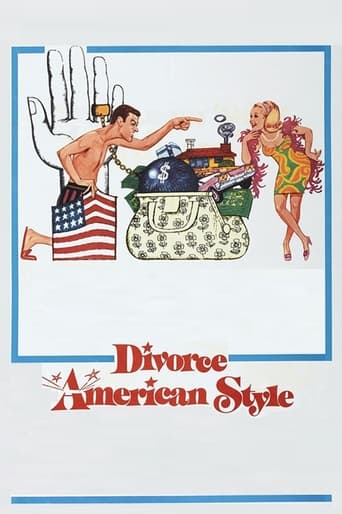bkoganbing
The strains of an almost 20 year marriage are starting to show in the marriage between Dick Van Dyke and Debbie Reynolds. So they've decided to get a divorce and just call it quits. And do it Divorce American Style. With a script by among others Norman Lear Divorce American Style is a look at the institution of marriage and the troubles of going through a divorce. They certainly can leave a man and even now, let alone 1967 broken right down to the burlap. A wiser head Jason Robards, Jr. has his own agenda as far as the Van Dyke/Reynolds divorce is concerned. Robards divorce from Jean Simmons is costing him plenty to. Simmons if she got married again would be someone else's financial burden. So get her to go out with Van Dyke. As for Reynolds, Robards and Simmons have an old friend in mind in used car king Van Johnson.What was fascinating here is that in 1967 the idea of the working woman had not taken hold yet. Neither Reynolds or Simmons or various others of the female gender is working. In fact the only working woman I see is a hypnotist who has a lounge act where the climax of the film occurs.There's a wonderful scene where divorce lawyers Dick Gauthier and Shelley Berman are making plans for golf outing in between Van Dyke and Reynolds. Lawyers too have lives away from their profession. There's also a nice scene with Lee Grant as an upscale prostitute.We were just free of the code, but having leads like Van Dyke and Reynolds guarantees this film will be slightly naughty, but no more lest they offend the family audiences these cultivated in their careers.
funkyfry
On the whole, this is not a great film, and it seems in a lot of ways like a feature length sitcom episode, esp. with Van Dyke doing essentially his stock character. Debbie Reynolds was done no favors by the wardrobe, hair and makeup departments, as I've never seen her less attractive at this point in her career. The film didn't spend enough time establishing her character either, to the point that I found myself rooting for Van Dyke to hook up with Jean Simmons' character. Jason Robards plays a very strange and kind of funny divorcée who is desperately trying to marry off his ex-wife (Simmons) in order to free himself to marry his (very pregnant) ditzy girlfriend from Bakersfield.The settings and music are quite typical and induce nostalgia even in those who did not live in that time and place. There are some really amusing gags that come and go, such as the son who keeps a scorecard of his parents' argument, and the beginning conceit with the conductor on the hilltop who seems, like a god, to be orchestrating all the arguments in the suburban valley below.These smart bits of humor don't really make the film flow any better or make it any more of a complete experience. By the time Van Johnson shows up, we're thinking there are so many interesting side characters that we don't really care anymore what happens to the original couple played by Van Dyke and Reynolds.
jwkenne
It seems that not everybody remembers the world in 1967.To begin with, there was no such thing as no-fault divorce. A divorce had to involve one "guilty" party, and one "innocent" party. Two "guilty" parties would just be blown off with "You two deserve each other." And it was regarded as standard good manners for the man to offer himself up as "guilty", unless the woman was a complete slut or psycho. (See "The Gay Divorcée" for an example of a man who /doesn't/ follow this social rule, because he's a pig.)Now, also during this period, the usual rule was that the wife got the kids, and the wife and kids were entitled to be just as well off as they had been before the divorce. (Remember, as far as the Law was concerned, she and they were officially innocent victims of the Big Bad Man.) So alimony could be very high indeed.As to her getting a job....There was no such thing as professional daycare. If a divorced woman were poor, she could probably leave the kids with a neighbor, because poor folks have been doing that for thousands of years, but for a middle-class divorced woman to do that would have been regarded as shameless freeloading.There were relatively few jobs for women, and even fewer that paid decently. A woman could be a secretary, but shorthand and typing take years of practice. (There were no personal computers then; few people could type except for writers and secretaries.) And secretaries didn't make much more than minimum wage, anyway. The same for stitchers in clothing factories (America had clothing factories back then). Beautician? Cleaning woman? Hotel maid? Nurse? None of them paid all that well. There were a handful of woman doctors, lawyers, and the like, but the closest pointer to the future was that there have always been quite a few women in computer programming. But you couldn't just walk in and ask for a programming job if you'd never done it before.In short, this movie makes the usual exaggerations you expect in a comedy, but it is nowhere near "preposterous" or "ridiculously unrealistic". It's pretty solidly grounded in 1967 reality.Now, on the other hand, I can't say I like the movie all that much. I guess I'm too romantic to take divorce as a joke. But the performances are sound, and I have to say that Van Dyke and Reynolds both had guts to tackle this script at all. Both of them have always been typecast as "lovable".
Irie212
I'm amazed I made it past the first half hour of this, beyond the scene where Lee Grant plays a prostitute (paid mistress, if you prefer) as if she was Joe Flynn's temperamental, demanding fiancée.The plot is preposterous—an abrupt divorce, contrived for no real reason, railroaded by opportunistic acquaintances and lawyers. What's even more contrived is the legal system, as pointed out in the IMDb review by "trudyr". This movie is one of those where the theme (divorce) suddenly redefines the entire world. Everybody's divorced- - oh, and by the way, the kids are just fine with it. In one scene, a mishmash of men and women—1st husbands, 2nd husbands, ex wives, current wives, and all the combined children— leave a group picnic. It attempts Keystone Cops-style mayhem, and if that isn't funny enough (it isn't), wait for the punch line: they leave one kid behind because nobody is sure who's responsible for it.The sad thing is that the four principals—Van Dyke, Reynolds, Robards, and Simmons—all do fine work. It's the only thing that raises this movie about the level of total disaster





